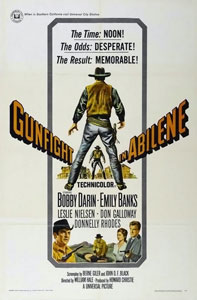| Gunfight in Abilene | |
|---|---|
 Film poster | |
| Directed by | William Hale |
| Screenplay by | John D.F. Black Bernie Giler |
| Story by | Clarence Upson Young |
| Produced by | Howard Christie |
| Starring | Bobby Darin Emily Banks Leslie Nielsen Don Galloway |
| Cinematography | Maury Gertsman |
| Edited by | Gene Palmer |
| Music by | Bobby Darin |
| Distributed by | Universal Pictures |
Release date |
|
Running time | 86 minutes |
| Country | United States |
| Language | English |
Gunfight in Abilene is a 1967 American Western film starring Bobby Darin in a non-singing role. [1] [2] It is the second film based on the short story "Gun Shy" by Clarence Upson Young, the first being Showdown at Abilene (1956), starring Jock Mahoney in the role played by Darin in the remake.